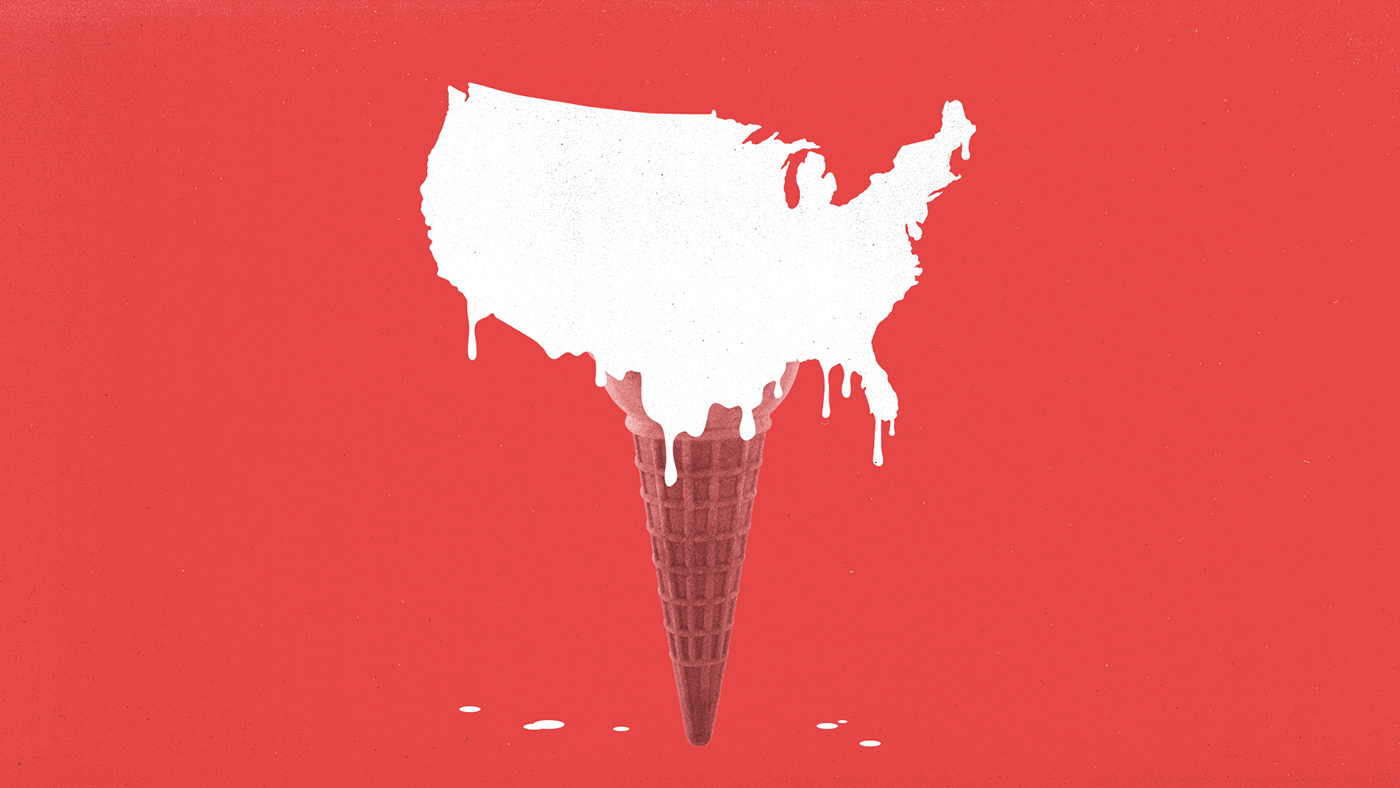How extreme weather is changing the traditional American summer
Climate change is ruining vacations and spoiling summer camp. Is there any upside?


A free daily email with the biggest news stories of the day – and the best features from TheWeek.com
You are now subscribed
Your newsletter sign-up was successful
It is shaping up to be the hottest summer on record — or more accurately, the most recent in an escalating series of hottest summers on record.
A few days of triple-digit heat can be remedied with some dips in the pool or an afternoon in an air-conditioned movie theater or shopping center. But when you get unrelenting weeks or months of days above 100 degrees Fahrenheit, or heat so brutal that touching monkey bars singes your hands and walking barefoot on the pavement, even to get to the swimming pool, leaves burns that require hospitalization — as is happening in Phoenix, Arizona, this summer — that changes the nature of the summer break.
If the ocean water you rely on for relief from the heat hits 97 degrees, as happened in Florida, you get no satisfaction. You only get wet. Or you may get flooded with torrential downpours, as happened as the Northeast dealt with its own unsettling summer weather. At the same time, parts of California and Canada are on fire. The same meteorological extremes are playing out in Europe and Asia, and climatologists say this could be the new normal. Or the new baseline.
The Week
Escape your echo chamber. Get the facts behind the news, plus analysis from multiple perspectives.

Sign up for The Week's Free Newsletters
From our morning news briefing to a weekly Good News Newsletter, get the best of The Week delivered directly to your inbox.
From our morning news briefing to a weekly Good News Newsletter, get the best of The Week delivered directly to your inbox.
Right now, much of the U.S. is being scorched by a "very very strong upper-level ridge of high pressure," Randy Ceverny of the World Meteorological Organization told The Associated Press. "Long-term: Global warming is causing higher and more frequent temperature extremes." Here are four ways extreme weather is changing the traditional American summer.
1. The great outdoors move indoors or off-limits
"The American summer vacation is an institution — and much of it takes place outdoors," Emma Pattee wrote at The Atlantic. "But as climate change makes summer hotter and hotter, some of the season's traditions are changing," and that means fewer "long afternoons at the playground" and less "swimming at the local pool." Increasingly, she added, "summer is getting too hot to be, well, summer."
For many Americans, summer beings with the Fourth of July. In 2023, July 4 was the hottest day ever recorded (so far), and several cities in tinder-dry areas of the Western U.S. and waterlogged Northeast scrapped or rescheduled their fireworks due to safety concerns. Some cities opted instead to host patriotic laser light shows or synchronized drone performances for viewers stalwart enough to brave the heat.
For the most part, cities like Phoenix and Las Vegas have become ghost towns during the day as people shelter inside air-conditioned spaces during the prolonged heatwaves. As the American summer becomes longer and hotter, "barbeque restrictions have also become commonplace, as have summertime bans on campfires in national forests during dry, breezy weather," The Washington Post reported in 2022.
A free daily email with the biggest news stories of the day – and the best features from TheWeek.com
"The past few summers, we've just seen such a constant parade of one climate-related event after another," Kristina Dahl, principal climate scientist at the Union of Concerned Scientists, told the Post. "This really does strike us as a point where we need to be shifting our thinking about summer and how we are approaching it."
2. Summer camp is less idyllic
There are few summer activities more American than summer camp, "an idyll for millions of children each year," The New York Times reported. "But climate change, which affects so many aspects of our lives, is upending the camp experience, as well."
In Michigan, camps have to respond to more frequent violent rainstorms, algae blooms in the heated water, "and — ugh — an explosion of ticks," the Times added. In the southwest, campers have to keep wet and hydrated during the mornings they spend outside. "In the Northeast and parts of the Midwest, rising summer-time temperatures and increasing rainfall have caused camp directors and summer youth program organizers to worry about heat stress, higher utility bills and flooding," not just scrapes and bruises, the Post reported.
Trackers, one of Oregon's largest outdoor camp programs, has set up camp in a former Marshall's department store in downtown Portland, The Atlantic reported. The camp directors have mixed feelings but understand there are times the outdoors won't cut it. "We don't fully understand the long-term effects of having children outdoors in extreme heat, yet we also don't fully understand what spending summers indoors does to kids," Pattee wrote.
At a Nevada 4-H sleep-away camp on the shorts of Lake Tahoe, campfires are a thing of the past, 4-H Camp education program coordinator Kenny Haack-Damon told the Post. Instead, the campers build solar ovens out of cardboard boxes and aluminum foil. "The point of camp is to be outside as much as possible," he said. "It's hard to think about what that's going to look like as things get warmer or wildfires become more of a threat."
3. Travel is increasingly hit-or-miss
High temperatures and other extreme weather is making for "nightmare summer travel," especially due to canceled and delayed flights, Amanda Hoover reported at Wired. Airplanes have "a disproportionate effect on the climate," but the airline industry is also especially "vulnerable to the effects of higher temperatures and changing weather patterns." Hot weather makes working on the tarmac excruciating, actually melts the tarmac in some cases, feeds forest fires whose smoke reduces visibility, and causes "more turbulence" and "problems with takeoffs," she added.
The extreme heat actually decreases air density, so planes need to fight harder against gravity to take off, requiring more time and greater distance, Hoover explained. That can lead to flight delays and cancellations — some airports can't accommodate the need for longer runways — but the inconvenience is only part of it, she wrote. "Turbulence isn't just unpleasant. It's the cause of more than one-third of injuries aboard air carriers," even death in rare cases, and "severe turbulence can cause structural stress to the aircraft."
4. Vacation destinations are unwelcoming
Assuming your flight gets you to your destination, on time or behind schedule, you may get the wrong kind of warm welcome. "Destinations that were once ideal for summer travel are now on the decline because of extreme heat and other effects of climate change," Axios reported. This summer that includes popular destinations in Southern Europe — there are severe heat warnings in parts of Italy, Spain, and Greece — but almost every attractive vacation spot could be awful to visit at any given time.
"The number one message is that nowhere is safe." Kate Marvel, a senior climate scientist at Project Drawdown, told Axios. "There's always the potential for a nasty surprise." And you can't know what climate-related catastrophe will strike when you book your trip. "I think increasingly, we are going to have to take into consideration risk assessment for weather and climate change," Frédéric Dimanche, director of Toronto Metropolitan University's Ted Rogers School of Hospitality and Tourism Management, told CBC News.
Florida and Las Vegas may be too hot to handle. California and just about any national park could be too smoky or even inaccessible due to wildfires. Lakes and coastal beaches may be inundated with seaweed blankets, toxic algae blooms, or pungent fish kills.
Tourists are already choosing to visit cooler places, like Denmark and the Netherlands, in the summer, or postpone their Italy vacations until September or October, the Times reported. And "climate change is also introducing wholly new destinations that were previously too cold to visit but have warmed enough for tourists," Axios added. "Greenland is building new airports to accommodate more international flights as it sees a rise in visitors."
Peter has worked as a news and culture writer and editor at The Week since the site's launch in 2008. He covers politics, world affairs, religion and cultural currents. His journalism career began as a copy editor at a financial newswire and has included editorial positions at The New York Times Magazine, Facts on File, and Oregon State University.
-
 Political cartoons for February 3
Political cartoons for February 3Cartoons Tuesday’s political cartoons include empty seats, the worst of the worst of bunnies, and more
-
 Trump’s Kennedy Center closure plan draws ire
Trump’s Kennedy Center closure plan draws ireSpeed Read Trump said he will close the center for two years for ‘renovations’
-
 Trump's ‘weaponization czar’ demoted at DOJ
Trump's ‘weaponization czar’ demoted at DOJSpeed Read Ed Martin lost his title as assistant attorney general
-
 How climate change is affecting Christmas
How climate change is affecting ChristmasThe Explainer There may be a slim chance of future white Christmases
-
 Why scientists are attempting nuclear fusion
Why scientists are attempting nuclear fusionThe Explainer Harnessing the reaction that powers the stars could offer a potentially unlimited source of carbon-free energy, and the race is hotting up
-
 Canyons under the Antarctic have deep impacts
Canyons under the Antarctic have deep impactsUnder the radar Submarine canyons could be affecting the climate more than previously thought
-
 NASA is moving away from tracking climate change
NASA is moving away from tracking climate changeThe Explainer Climate missions could be going dark
-
 What would happen to Earth if humans went extinct?
What would happen to Earth if humans went extinct?The Explainer Human extinction could potentially give rise to new species and climates
-
 Bacteria can turn plastic waste into a painkiller
Bacteria can turn plastic waste into a painkillerUnder the radar The process could be a solution to plastic pollution
-
 Florida has a sinking condo problem
Florida has a sinking condo problemUNDER THE RADAR Scientists are (cautiously) ringing the alarms over dozens of the Sunshine State's high-end high-rises
-
 Diamonds could be a brilliant climate solution
Diamonds could be a brilliant climate solutionUnder the radar A girl and the climate's best friend
